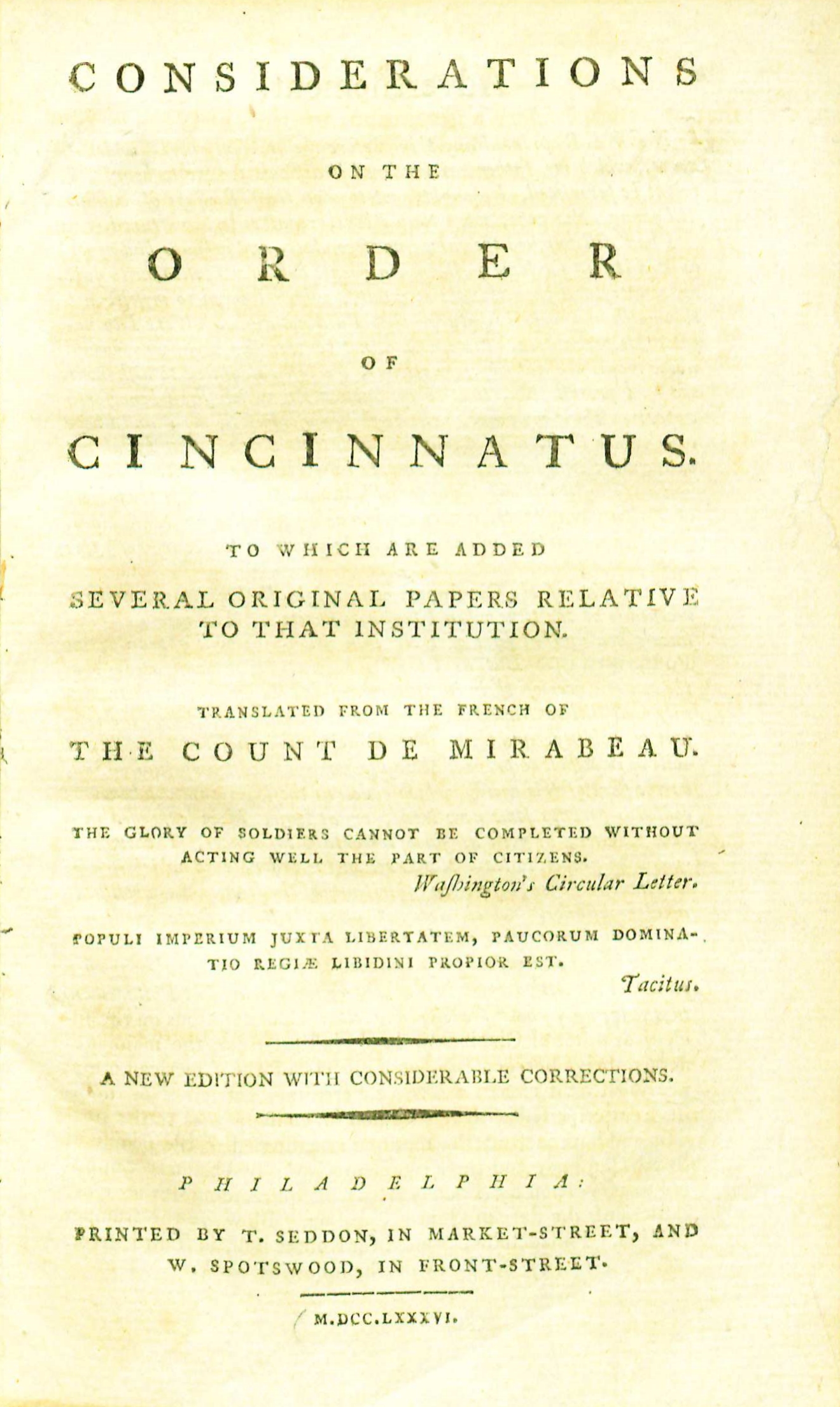Considerations on the Order of Cincinnatus to Which are Added, as well Several Original Papers Relative to That Institution
by Comte Gabriel-Honoré de Riquetti de Mirabeau
| Considerations on the Order of Cincinnatus | |
|
Title page from Considerations on the Order of Cincinnatus, George Wythe Collection, Wolf Law Library, College of William & Mary. | |
| Author | Comte Gabriel-Honoré de Riquetti de Mirabeau |
| Published | Philadelphia: Printed by T. Seddon ... and W. Spotswood ... |
| Date | 1786 |
| Edition | New edition with considerable corrections |
| Language | English |
| Pages | iv, 68 |
| Desc. | 8vo (22 cm.) |
| Location | Shelf C-1 |
Comte de Mirabeau, Honoré Gabriel Riqueti (1749-1791) was born on March 9, 1749 at Bignon, near Nemours. [1] Son of a respected French economist and grandson to Jean Antoine, hero of the 1705 Battle of Cassano, Mirabeau enjoyed the privileged upbringing of a nobleman. [2] Mirabeau began his armed service career in 1767 following years of training in French military school. [3] Mirabeau's propensity for initiating scandalous love affairs, acquiring large gambling debts, and igniting heated arguments with superiors led to several imprisonments and exiles.[4] Escaping prison at the castle of Joux with his mistress Sophie, Mirabeau fled to neighboring Switzerland.[5] While Mirabeau lived abroad, French authorities condemned him to death at Pontarlier for abduction and robbery. In May 1777, French police seized Mirabeau and returned him to prison once more, this time in the castle of Vincennes.[6]
From prison, Mirabeau launched his extensive literary career, drafting several titles before earning a reversal of his death sentence. After his release, Mirabeau's political discourse adopted a distinctly populist flair.[7]. Attacking the existing French order with pointed censure, Mirabeau occasionally retreated to Holland and London as a way of calming the controversy generated by his writings.[8]
On one such furlough to London, Mirabeau authored Considerations on the Order of Cincinnatus in response to American pamphlets by Aedanus Burke (1743-1802) of South Carolina. Under the pseudonym "Cassius," Burke circulated two pamphlets, An Address to the Freemen of South Carolina (January 1783) and Considerations on the Society or Order of Cincinnati (October 1783), where Burke condemned the Society of the Cincinnati, a lineage organization established to preserve the ideals and fellowship of the officers of the Continental Army who served in the Revolutionary War, as an attempt at reestablishing a hereditary nobility within America's budding republic.[9]
Burke's arguments appealed to Marabeau's distrust of established political order, a political theme catching fire in late-eighteenth century France. In drafting Considerations on the Order of Cincinnatus, Marabeau utilized materials personally provided by Benjamin Franklin, whose role as Minister to France effectively muzzled any ability to publicly criticize the the French monarchy.[10]
Though posthumously considered critical to the developments of the French Revolution, Marabeau's contributions to history are often examined with mixed opinion. Following Marabeau's death, evidence produced at Revolution-era trials exposed his hidden loyalty to the crown and workings as an intermediary between major incumbent and revolutionary forces.[11]
Evidence for Inclusion in Wythe's Library
The Jefferson Inventory of Wythe's Library includes the notation Mirabeau, Turgot etc 8vo. for a title given by Thomas Jefferson to his son-in-law, Thomas Mann Randolph. A title later listed on Randolph's 1832 estate inventory as "'Consideration for the order of Cincinnati' ($2.25 value)" may be the same book. We do not have enough information to conclusively prove that Wythe owned Considerations on the Order of Cincinnatus. Nor can we identify which edition Wythe owned, or whether he owned the French original or the English translation. George Wythe's Library[12] on LibraryThing indicates this, adding "Several editions in French and England were published at London and Philadelphia." The Brown Bibliography[13] lists both the 1784 first French edition and the 1785 first American edition, indicating that Wythe probably owned the English edition. Since the edition in unknown, the Wolf Law Library purchased an available copy of the 1786 English edition printed in Philadelphia.
Description of the Wolf Law Library's copy
Modern rebound in quarter calf with marbled boards. Gilt lettering and blind rules to spine.
Images of the library's copy of this book are available on Flickr. View the record for this book in William & Mary's online catalog.
See also
References
- ↑ Encyclopedia Britannica, s.v. “Comte de Mirabeau, Honré Gabriel Riqueti.” In http://en.wikisource.org/wiki/1911_Encyclop%C3%A6dia_Britannica/Mirabeau,_Honor%C3%A9_Gabriel_Riqueti,_Comte_de. Last modified November 3, 2014.
- ↑ Ibid.
- ↑ The New International Encyclopedia, s.v. “Count de Morabeau, Gabriel Honore Riqueti.” In http://en.wikisource.org/wiki/The_New_International_Encyclop%C3%A6dia/Mirabeau,_Gabriel_Honor%C3%A9_Riqueti,_Count_de. Last modified December 16, 2011.
- ↑ Ibid.
- ↑ Ibid.
- ↑ Ibid.
- ↑ Encyclopedia Britannica, s.v. "Comte de Mirabeau, Honré Gabriel Riqueti
- ↑ Ibid
- ↑ Ibid.
- ↑ The new International Encyclopedia, s.v. “Count de Morabeau, Gabriel Honore Riqueti.”
- ↑ Ibid.
- ↑ LibraryThing, s.v. "Member: George Wythe," accessed on June 18, 2015.
- ↑ Bennie Brown, "The Library of George Wythe of Williamsburg and Richmond," (unpublished manuscript, May, 2012, rev. May 2014) Microsoft Word file. Earlier edition available at: https://digitalarchive.wm.edu/handle/10288/13433.
